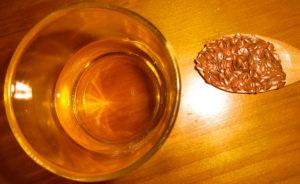Amazing flax seed oil
In my book: “Thyroid and Graves’ disease unmasked” I have talked in great detail of many helpful supplements for Graves’ disease. One of them is flax seed oil. I had found flax seed oil to be very helpful for me during my thyroid travels. It was an amazing supplement for me when I was thyrotoxic on levothyroxine hormonal replacement only. It was also very helpful for PMT relief and generally great for my well being. Years back, before I added NDT to my levothyroxine hormonal therapy, I had too much T4 and not enough T3 and suffered through a madness of negative symptoms. The only thing that helped me relieve those symptoms was flax seed oil. I was so desperate sometimes, I was taking it by table spoon even in the middle of the night. It had never failed to calm my nervous system. It helped with my heart palpitations, anxiety, working in about half an hour after taking it.
Flax seed oil may be very beneficial for those with Graves’ disease (about a teaspoon daily, depending on your tolerance). A scientific literature (1) reports a case of remission from Graves’ disease using omega3 fatty acids in flax seed oil. Flax seed oil is not a treatment for Graves’ disease but as supplement it may assist with remission.
It still helps me, even after my thyroid surgery. I use it only when I feel tense and nervous (great for PMT). It is like a soothing balm for my nerves and it makes sleeping easier.
Let’s then talk about flax seed oil. I believe it is a super star of oils. Flax seed oil contains both omega-3 and omega-6 fatty acids and has a good omega- 6 to omega- 3 ratio as well as vitamin E. It is the richest source of omega 3 fatty acid ALA (alpha-linoleic acid), which our body can then convert into molecules DHA and EPA as required. ALA fatty acid by itself is very protective for our health. DHA and EPA are the major anti-inflammatory oils being the essential building blocks for prostaglandins (immuno-regulatory molecules). The lack of prostaglandin E3, for example, has also been implicated in migraine headaches and high blood pressure. EPA oils are capable of turning off body’s pro-inflammatory cytokines. Components of flax seed oil were found to reduce inflammation which may be very helpful for autoimmunity problems. Flax seed oil helps with detoxification processes in liver and helps to balance sugar. It has a calming effect on the heart and nervous system as the heart muscle likes to use fatty acids for energy production. Flax seeds are also packed with minerals such as manganese, magnesium and phosphorus.
Flax seed oil (in excessive amounts) can inhibit T3 nuclear binding which benefits those with Graves’ disease. Flax seed oil can also mildly suppress thyroid function. It may help to release endorphins in the body. It is also great for PMT. Flax seed oil is a phytoestrogen which mean it can help with estrogen dominance and PMT, replacing strong estrogen in the body for mild phytoestrogens. It is believed to be anti-cancer food.
Flax seed oil is a fragile oil as it get oxidized easily so it needs to be fresh and kept in the fridge. It is not suitable for cooking. It needs to be cold pressed and is usually sold in dark containers from fridges. It can be purchased from pharmacies and health shops. Flax seed oil helps with lubricating the intestine wall and absorbing toxins for elimination from the body and in some people it may have a slightly laxative effect. It is best to take flax seed oil with food (it can be added to salads).
Consult your doctor before using flax seed oil, especially if you have a history of chronic diarrhea, irritable bowel syndrome, inflammatory bowel disease, diverticulitis, oesophageal and gastrointestinal stricture, bowel obstruction, bleeding disorder or take medications that increase the risk of bleeding, in conditions of breast cancer, uterine cancer and endometriosis. Speak to your doctor about flax seed if you are pregnant or breastfeeding. Avoid if allergic to flax seed or other plants of the Linaceae family. Flax seed oil is a blood thinner and should not be used before a surgery.
This blog is for educational purposes only.
References:
- Sarah J Breese McCoy. Coincidence of remission of postpartum Graves’ disease and use of omega-3 fatty acid Thyroid. 2011. URL: https://thyroidresearchjournal.biomedcentral.com/articles/10.1186/1756-6614-4-16.
- Kaithwas G, Mukherjee A, Chaurasia AK, Majumdar DK. Anti-inflammatory, analgesic and antipyretic activities of Linum usitatissimum L. (flaxseed/linseed) fixed oil. Indian J Exp Biol. 2011 Dec; 49(12):932-8.
- Wiersinga WM, Chopra IJ, Teco GN. Inhibition of nuclear T3 binding by fatty acids. Metabolism. 1988 Oct; 37(10):996-1002.
- Wiersinga WM, Platvoet-ter Schiphorst. Inhibition of nuclear T3 binding by fatty acids: dependence on chain length, unsaturated bonds, cis-trans configuration and esterification. M.Int J Biochem. 1990; 22(3):269-73.


